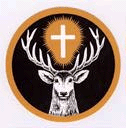
Eustace Families Association

Maurice Eustace
(1595-
Maurice Eustace of Harristown, born 1595, was the great nephewof Maurice of Castlemartin, the martyr. After being student,graduate and fellow of Trinity College in Dublin, he studied lawin England at Lincoln's Inn.and was called to the Bar 1625. His.exceptional ability was soon earning him large fees and by1634 he was Leader of the Irish Bar. That same year he became forM.P. Athy and in 1639 was appointed Speaker of the House ofCommons, receiving a knighthood. Over the next twenty years hewas given many generous royal grants for services as Speaker andother functions.
In 1645 at his country estate of Harristown, he built a finehouse, but only three years later, this burnt before his eyeswhen captured by Parliamentarian Colonel. Hewson. With otherRoyalists Sir Maurice was imprisoned at Chester for seven years,only narrowly missing exile in Jamaica. He was released in 1655and returned to Dublin only to be re-arrested on a charge ofcommunicating wiith Charles II. He was set free but under strictsupervision. Meanwhile tthose of the Eustaces who wereCatholic had fared much worse, many being deprived of lands andpossessions.
On the restoration of Charles II in 1660, Sir Maurice wasrewarded for his loyalty and appointed Lord Chancellor ofIreland. A special frigate carried him back to Dublin. In 1661King Charles granted Sir Maurice the lands of Castlemartin thathad been forfeited by his cousin together with half of the baronyof Rathdownry. In 1663 he decided to build and endow a church andschool at Baltinglass and also to build new bridge and market .
He had already built himself a town house in Dublin on thegrounds of which ran from Dame Street to the banks of the Liffey.Part of the site is now Eustace Street. In letters of that timeit is clear that the king proposed to make him Baron Eustace, buthaving no sons of his marriage, Sir Maurice was endeavouring toarrange inheritance of his tiitle and lands by his illegitimateson, Maurice Eustace of Whitchurch. Unfortunately Sir Mauricedied during the negotiations so that the whole question of apeerage was dropped. His widow, Dame Charity, was a well knownfigure in Dublin society until her death.in 1678,
His younger nephew, also Sir Maurice, was his principal heiralthough estates were left to his brother Sir John and theirsister's husband. He in.turn was called to the Bar, elected M.P.for, Knocktopher and made Privy Councillor in 1665. Harristownunder his hand became a showplace in Kildare. In 1673 his wifeAnne.
died and catastrophe struck when James II became king - everyroyal grant -to Protestant Harristown was reversed. Both. Mauriceand his brother John had to flee the country. On the accession ofWilliam III, Sir Maurice returned but it was not until 1700 thathe regained full possession of his estates. Sir Jobn diedunmarried and left only debts.